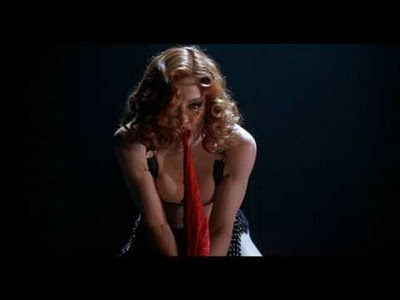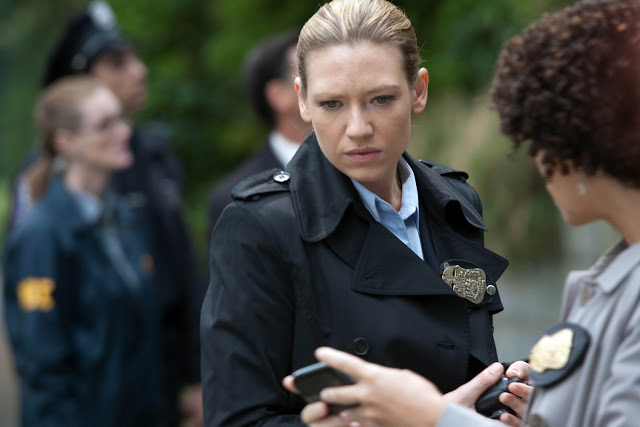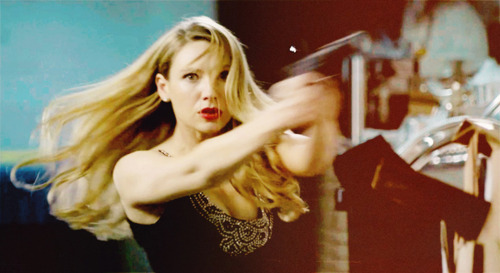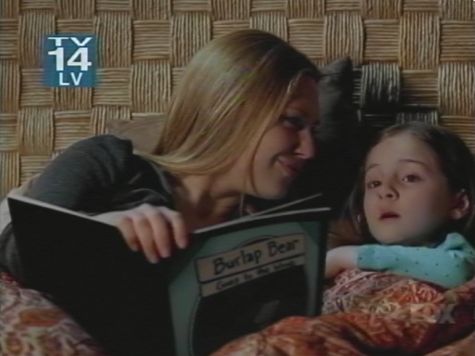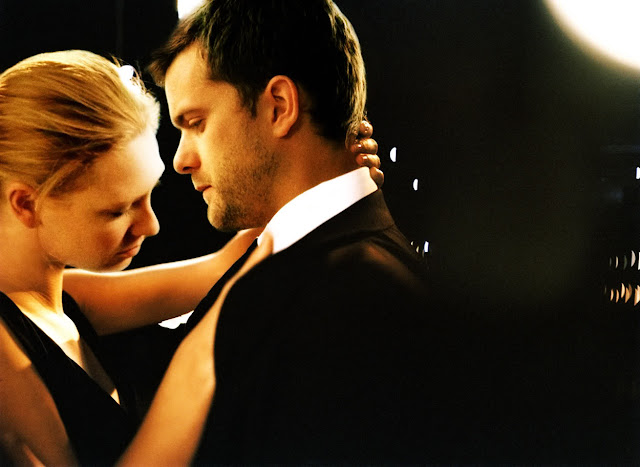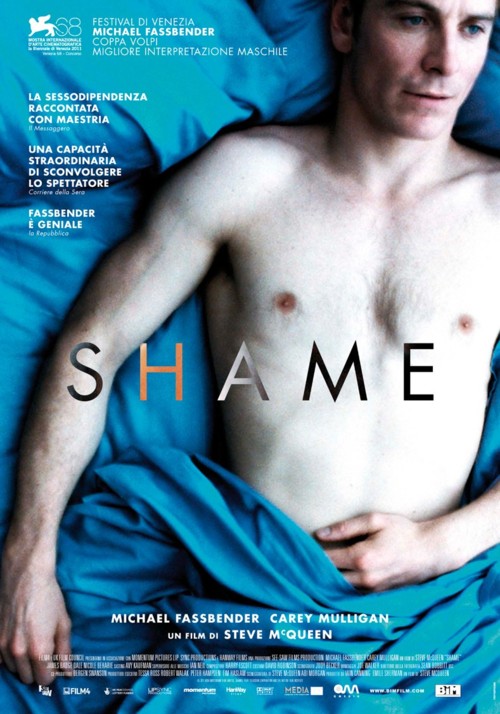“We’re not bad people. We just come from a bad place.”
Shame, Director
Steve McQueen‘s second feature-length film (which he also co-wrote the screenplay for) tells the tale of Brandon Sullivan, played by
Michael Fassbender. This is McQueen and Fassbender’s second film working together, the first being
Hunger (2008). Mr. Sullivan is a successful bachelor who has struck a tremulous balance between his professional life and his secret addiction to sex. The comfortable routine that he has settled into is disturbed, however, when his sister Sissy Sullivan, played by
Carey Mulligan, decides to crash at his place for a few nights.
Although that little synopsis might not sound so riveting, it is McQueen’s writing/direction along with Fassbender and Mulligan’s acting abilities that makes this a truly awesome film. And I don’t mean to say “awesome” in the watered-down, lackluster way that it is used every day. I was literally awe-struck for at least 9/10s of the movie. Although it gets off to a slow start and the narrative isn’t necessarily complicated, the two main characters will put you through a gamut of emotions.
Aside from excellent performances, the cinematography of this piece is responsible for every stricken nerve. This is due to the camera’s unapologetic presence in each scene. Sometimes over the shoulder or sneaking from the side, each shot is generally in the characters’ faces, quite literally.
For example, in a scene where Brandon and his boss (who turns out to be a real sleaze) go to see Sissie sing at a ritzy establishment, the camera is intimately close to her:
 |
| Carey Mulligan as Sissy Sullivan |
That picture doesn’t necessarily serve the scene justice, as at one point Mulligan’s face is the only thing visible, almost invoking the famous singing lips of the Rocky Horror intro. The camera’s (pardon the pun) in-your-face position subjects the viewer to every minuscule tremor of emotion present in the lips and eyes. It is almost unsettling, as it does not offer a safe place to rest your eyes (which, of course, makes it a magnificent tactic).
You may notice that I use words like “uncomfortable” or “unsettling” a lot throughout this review. The music doesn’t do anything to alleviate the general discomfiting feel of the film. Saying that the score of Shame is sparse might be an understatement. Disquieting scenes are made all that much more upsetting because there isn’t any music to lean upon. However, when instruments are finally introduced it is in the classical style, lending a juxtaposition between the emotionally horrific subject matter and the music we associate with beauty and grace.
Perhaps the film’s most impressive aspect is its treatment of sex. As mentioned above, Brandon is a sex addict. However, there is nothing even remotely “sexy” about the numerous (and I mean numerous) sexual encounters that Brandon achieves. Shame is a masterful character study and is very informative about a subject that we don’t really talk about as a society or that we dismiss readily. People joke that if they had to be stricken with an addiction, sex would be their choice. I would recommend they watch this film before making such haughty claims.
On a very basic level it is a downward-spiral narrative as seen is other addiction-based films. However, unlike a film such as Blow, where drug addiction has its peak then descends into madness and poverty, Shame is one long “all is lost!” moment, degrading from “manageable” to an almost primal need to score (in Brandon’s case, engage in sexual activity). This is where the amazing acting comes into play with Fassbender’s hauntingly hollow and hurt gazes toward the camera, ergo the viewer. It is evident that although Brandon is addicted to the pleasure of intercourse, he doesn’t enjoy it. The addiction has become a crippling factor of his psyche, as he can’t even ride the subway or have access to a computer without actively seeking sex or pornography.
In the first portion of the film’s climax we see Brandon on the subway, looking a little worse-for-wear: flushed and sporting a gash on his cheek. The film takes a risk here, as the otherwise linear narrative breaks apart, allowing us to see just how he made it to this moment. Without giving too much away, allow me to say that when it is revealed how his face got cut, we see the otherwise sympathy-worthy character turn himself over to the addiction and become someone else entirely. Someone sinister and ultimately disgusting. And he doesn’t stop there. By the end of the flashback sessions we find him pull out a last resort and cruise a gay bar/sex den.
I will pause the review in order to address the mild controversy that has arisen from this segment of the film. I will say that although Brandon’s all-time-low is engaging in homosexuality, this isn’t meant to paint a negative picture of homosexuals. Instead, it is only used to illustrate the lengths and personal boundaries that Brandon will sacrifice in order to get his fix. Throughout the film, Brandon is depicted by an exclusively heterosexual man. As a gay man, I rationalized it thusly: for Brandon, having sex with a man is equivalent to a homosexual having heterosexual sex, a.k.a. something uncomfortable and not very enjoyable. If Brandon’s character had been a homosexual, perhaps this rock-bottom moment would be conveyed using a run-of-the-mill night club and some heavy-handed seduction of a lady.
Resuming the review. A mysterious but cringe-worthy aspect of this film is the dynamic between Brandon and Sissie. The quote that I used to open this review is from Sissie on a voicemail to Brandon just before the final gut-punch of the film (which I most certainly will not give away). I think this is a reference to Brandon and Sissie’s shared early life, which may or may not have been sexually abusive. This particular plot point is my only negative critique. Although I don’t oppose including such an element to the character’s back-story (as it would flesh them out and perhaps give another empathetic foot-hold for viewers), instead I am disappointed at how much of a mystery they left it.
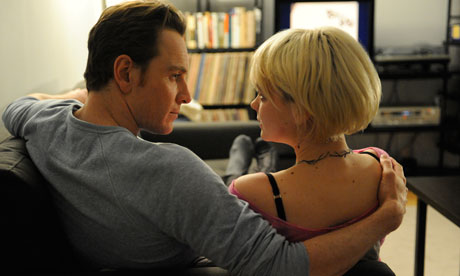 |
| Fassbender and Mulligan |
There is a particularly nail-biting scene where Brandon and Sissie are sitting on the couch. The camera (of course) is positioned just behind them so their profiles or on either side of the screen, the television just visible beyond them. Within this scene their characters are deepened a considerable amount, as they explore the obligations present in being siblings but overall the responsibilities we have as people. However, the film misses this great opportunity for one of them to mention what about their childhood could turn Brandon into a sex addict and Sissie into a fly-by-night codependent.
All in all, Shame is certainly worthy of any award it is nominated for. The characters are riveting despite the missed chance at depth, the camerawork inspires an almost invasive yet voyeuristic feel and it is one of the very few films that deal with sex addiction in a mature manner.
Clint Waters is a creative writing major, German minor at Western Kentucky University. He is in his final year and hopes to pursue any career that remotely deals with writing in a creative fashion. Visit his blog at redintooth.tumblr.com





